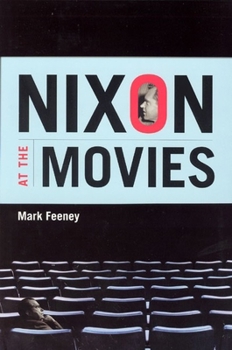Nixon at the Movies: A Book about Belief
Select Format
Select Condition 
Book Overview
Was it an omen? Richard Nixon and the film industry arrived in Southern California in the same year, 1913. As Mark Feeney relates in this unusual and unusually absorbing book, Nixon and the movies have shared a long and complex history. Some of that history--the president's multiple screenings of Patton before and during the invasion of Cambodia, or Oliver Stone's Nixon--is well known. Yet much more is not. How many are aware, for example,...
Format:Hardcover
Language:English
ISBN:0226239683
ISBN13:9780226239682
Release Date:November 2004
Publisher:University of Chicago Press
Length:436 Pages
Weight:1.35 lbs.
Dimensions:1.4" x 6.0" x 9.0"
Customer Reviews
5 ratings
images and reflections
Published by Thriftbooks.com User , 19 years ago
This is an incredible book, approaching Nixon's life through the movies he was known to have seen and liked. The result is an overlapping portrait that is both unexpected and insightful--in one chapter he's being likened to Walter Neff from Double Indemnity; in the next he's seen wishing desperately (yet a touch ambivalently) to be John Wayne. I'm entranced--something I never thought I'd say about anything related to Nixon.
"My fellow American moviegoers . . ."
Published by Thriftbooks.com User , 19 years ago
There should be equal time for a book about JFK and the movies. JFK appears everywhere in the American cinema, from THE MANCHURIAN CANDIDATE to PT-109 to THE GREEK TYCOON, not to mention his own real life romances with movie stars like Gene Tierney. His father made a pass at becoming a tycoon during his own affair with silent star Gloria Swanson. It might be, however, as Feeney suggests, that Nixon is a more natural film subject, if only because the shadows are darker when it comes to Nixon, and the contrasts between the light of California and the darkness of Watergate and Cambodia is more shocking. We knew that Nixon watched a lot of movies while he was President, but it's startling indeed to see him attending several movies a week even when he was "in between jobs." Feeney shows how Nixon and American film grew up at the same time, even though he may be stretching a point to cite De Mille's SQUAW MAN (1913) as the first American full length film, that's simply wrong. You might as well call John Waters' SERIAL MOM the last American movie, since bizarrely enough that was the number one movie at the box office the day Nixon died (April 22, 1994). I liked Feeney's writing throughout, and the parallels he makes between Nixon's character, and the character of several American film heroes (like the part Jack Lemmon plays in THE APARTMENT) is always clever and rings surprisingly true. There is something, perhaps, about identifying oneself as a member of the moviegoing audience, as Nixon did, that makes you a little more --what, passive? -- than other US politicians.
Siskel, Ebert, and Nixon?
Published by Thriftbooks.com User , 20 years ago
Did Nixon miss his calling? Should he have been a Hollywood film reviewer? Nixon was born near Hollywood, where characters were reshaped and manufactured, in 1913, the same year that Hollywood produced its first film, Cecil B. DeMille's "The Squaw Man." In a time before DVD's and VHS/Betamax (when "R" rating meant Regular, not Restricted (hehe)), he watched 538 films during his 67 months in the Presidency (not counting his Vice Presidency under Eisenhower); he was screening about two 35mm films per week, sitting in a darkened room. But aside telling us that Nixon viewed PATTON three times during the VietNam War and Cambodian incursion (both Patton and Nixon suffered the indignities of serving under Eisenhower), or that he loved the works of John FOrd, and in his last White House years, more classic films were selected for him, the author creates a fascinating portrayal of Nixon and a cultural history of America's hopes and dreams and myths and realities, specifically through the metaphors of some of the following films: THE CONVERSATION (1974, Gene Hackman is filled with guilt and secrets, hidden away); PATTON (1970, war, leadership, and Eisenhower); MISTER ROBERTS (1955, the banality of being an administrator); DARK VICTORY (1939, Reagan plays a playboy as Bette David is dying and George Brent is trying to sure her, contrasting Nixon's ambitions to those of a playboy); and DOUBLE INDEMNITY (1944, growing up in Southern California)
NIXON, YOU OLE DOG!
Published by Thriftbooks.com User , 20 years ago
I absolutely love NIXON and everything having to do with him. It amazes me that after so many years people are still able to surprise me with information I did not know about the man. Fascinating look at Nixon and the way he was he was shaped by the films he watched, and the psychological implications of those films. What a read !
Nixon and Hollywood -- a love affair
Published by Thriftbooks.com User , 20 years ago
This is a wonderfully written book by Boston Globe journalist Mark Feeney, who clearly is passionate about his subjects: Nixon + movies. Feeney offers a beautifully nuanced portrait of our most complicated president, a devotee of movies, and his time. Feeney explores Nixon's life, personality, and political career through the lens of his involvement with the media, in particular his preoccupation with Hollywood movies. The President sought inspiration in them and even found in movie characters role models for himself--he drew inspiration, for example, from George C. Scott's impersonation of General Patton during the darkest days of the Vietnam War. Hollywood, too, was enamoured of Nixon, and Feeney explores how he has been portrayed by a wide range of directors, and how his presence seems to saturate so many films of the 1970s--including "Shampoo" and Francis Ford Coppola's "The Conversation." Feeney pulls it all off with sparkling wit and a genuine sympathy for his subject. A fascinating book about a fascinating president. Highly recommended.





